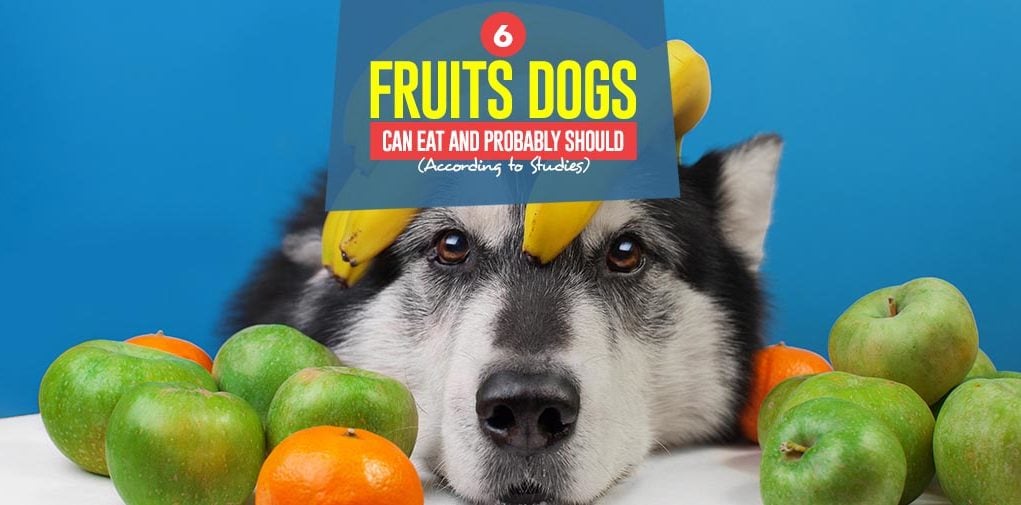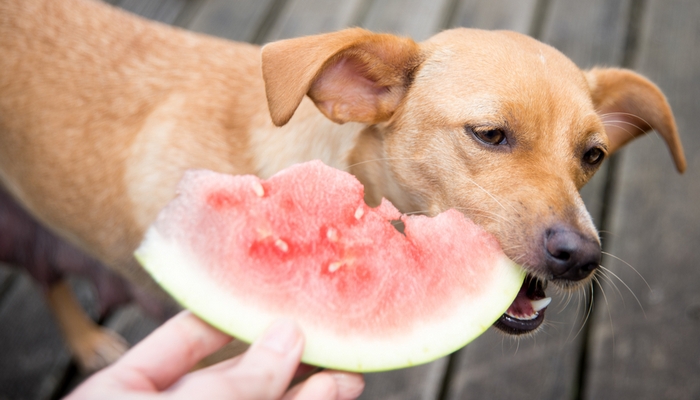Not all foods are created equally, and this is especially true for the different kinds of foods that you feed your dog. In human diets, fruits are held in high regard. When feeding Fido, you need to remember that there are fruits dogs can eat and fruits that are toxic to our canine companions.
For humans, fruits are seen as a great source of natural and easily digestible natural sugars, vitamins, trace minerals, and they just plain old taste good. But, can the same be true for canines? The short answer is yes, but not all fruits are safe for dogs.
Much like in humans, fruits have the potential to positively effect a dog's health. However, just like with many other “bad” human foods, there are some fruits that are not easily digested by canines, while some can be even toxic to dogs and will be fatal (like grapes).
Then there’s also the amount of sugars contained within fruit to consider. Most humans don’t need to worry about natural sugars in every single fruit we eat, barring the person doesn’t have a metabolic condition like diabetes. Since we will be giving the dogs the fruits, we need to watch how much of it we give as some fruits contain so much sugar that, were moderation not practiced, would end up compromising the health of the dog.
With that in mind, here are six fruits that are actually very nutritious and safe for dogs to eat. Remember, if you want to give your dog fruit, start by feeding a very small quantity and observe your pet for any signs of an allergic reaction. If no reaction is seen, you can use these fruits as a healthy alternative to commercial dog treats.
MORE HERE: 11 Best Superfoods for Dogs That May Improve Their Health
6 Fruits Dogs Can Eat and Probably Should
(based on scientific studies)
1. Apples
An apple a day keeps the doctor away, or so the old saying goes. While you may not want to necessarily stick with this apple feeding schedule, giving your pooch an apple now and then will do him a world of good. Low in protein and fat, apples are a great source of vitamins A and C and one of the best fruits dogs can eat.
Apples contain Vitamin K and pectin, which is a soluble fiber and is great for scrubbing teeth and intestines of detritus. While most focus on the virtues of the vitamins contained within apples, it is actually the fiber which is to be celebrated. The soluble fiber contained in apples' flesh was shown to improve digestion and nutrient absorption in dogs (1).
There are, however, a couple of things to watch out for when it comes to feeding apples to dogs, not the least of which are apple seeds. Consuming apple seeds can be fatal for your dog, as they contain trace amounts of cyanide that dogs have a nearly impossible time passing through their system, and then there's also GI tract problems.
RELATED: Proven Benefits and Side Effects of Apples for Dogs
The stem and core of apples should also be withheld from dogs, as they may serve as choking hazards. This is especially important for larger dogs that tend to forego chewing and just swallow the small core or stem whole when consuming apples.
2. Bananas
Next on our list of fruits dogs can eat is the banana. I have yet to encounter a dog that doesn’t like bananas. This is most likely due to the plethora of sugar they contain, which is why it's so important to ensure you feed them to your pet in moderation.
Bananas are an excellent fruit to give to your dog. Low in cholesterol, sodium and saturated fats, this fruit is an excellent source of Vitamin C, potassium, magnesium and, much like apples, dietary fiber. For many people, potassium has become synonymous with bananas. As such, bananas have been seen as a quick source of energy.
There's evidence to suggest that potassium from bananas has a similar effect on dogs (2).
Potassium has also been shown to play a part in initiating a cardiovascular response to static muscular contractions. This once again shows the effects that potassium has on muscular contractions, much like how humans tend to eat a banana when they suffer a cramped muscle.
RELATED: Proven Benefits and Side Effects of Bananas for Dogs
While bananas do contain a lot of sugar and should be given to dogs in moderation, it can be very beneficial to feed your dog bananas on a regular basis. Once again, potassium is the primary the reason. A few studies have noted that dogs who suffer a sodium to potassium imbalance have been known to develop renal disease (3).
3. Watermelon
Much like bananas, watermelons are very low in saturated fats, sodium and cholesterol. This fruit dogs can eat also contains a decent amount of potassium. Watermelons are one of the best fruits dogs can eat, because they are an excellent source of different vitamins and minerals, but in particular Vitamins A, B-6 and C.
Since watermelons are mainly composed of water (up to 92%), they are an excellent way to keep your dog hydrated, too. There are a couple of safety tips to keep in mind though. Remove the rind, as it is mostly indigestible fibers that your dog could end up choking on. Likewise, remove the watermelon seeds, as they could cause intestinal blockage.
RELATED: Proven Benefits and Side Effects of Watermelon for Dogs
Watermelon is a beloved fruit that is treasured for its taste as much as its thirst quenching properties. However, there is evidence to suggest that it can also benefit animals suffering from diabetes (4) due to its limited ability to protect pancreatic cell death.
Another study with rats observed that watermelon juice can aid in the treatment of liver toxicity (5) by protecting liver, kidney and brain tissue from certain harmful chemicals.
Vitamin B6, also known as pyridoxine, is one of the main compounds found within watermelons. It is essential in the processing of proteins in the body. Furthermore, the maintenance of a healthy level of vitamin B6 is necessary for the health of blood vessels.
4. Strawberries
Next on our list of the fruits dogs can eat is the strawberry. These small red fruits are excellent sources of folate, potassium, dietary fiber, vitamin C and magnesium. Berries in general are known to be great for dogs for their low calories and high nutrient content.
Strawberries also contain an enzyme called malic acid, which acts as a tooth whitener and essentially helps clean the dogs teeth while eating it. While all these factors are great for dog's health, the effects that eating strawberries can have on the dog's aging process is what scientists, researchers and dog lovers everywhere are eyeing.
RELATED: Proven Benefits and Side Effects of Strawberries for Dogs
You can read more studies on feeding strawberries to dogs in the above link, and the New York Times has written a great article on studies that suggests that the vitamins and the antioxidants contained within strawberries gives the dog a fighting chance in reducing age-associated cognitive decline.
Further research also shows that brain tissue may be highly susceptible to oxidation and the actions of free radicals. The natural antioxidants in strawberries is one of the best natural ways to combat their effects and reduce the effects of aging process in dogs.
5. Blueberries
The virtues and praises of blueberries have been sung by people for many decades now, and with just cause. Blueberries are popular, they taste delicious and possess a ridiculous amount of antioxidants in such a small fruit. One of the best fruits/berries dogs can eat, the antioxidants in blueberries prevent free radicals from causing disease and harm to the dog by damaging tissue and DNA.
Here's the thing: much of the oxidative damage seen in dogs is theorized to be exercise induced. The majority of dogs were born and bred to work, to move and to be in constant motion. An unfortunate bi-product of this is the release of free radicals in the dog's body.
The phenolics, the antioxidant compounds in blueberries, combat free radicals and, to a degree, prevent the oxidative damage that would usually lead to the formation of diseases like cancer. Blueberries’ antioxidant properties are not only reserved to benefit the bodies of dogs but their minds as well.
RELATED: Proven Benefits and Side Effects of Blueberries for Dogs
Blueberries is one of the most scientifically studied fruits on the planet, and research indicates that antioxidants improves the cognitive performance and ability of aged dogs.
It is believed that oxidative damage is to blame for an acceleration in cognitive decline as a dog ages (6). Therefore, by decreasing the damage done by free radicals and oxidation, the cognitive decline of an aging dog is slowed as well.
Finally, the antioxidant phenolic compounds in blueberries have been shown to give the dogs' DNA some protection and boost their immune system (7) by a large margin. Once again, it is due to the free radical-fighting properties that blueberries are able to prevent diseases, disorders and illnesses in dogs from taking hold.
6. Oranges
It is unsurprising that the fruit that has been dubbed the “sunshine fruit” is loaded with vitamin C, thiamine, folate, potassium and dietary fiber. Only remember that before giving your pet oranges, you must discard the peel and seeds as suggested by vets.
This is because the abrasive nature of both peel and seed of oranges may cause problems with the dog's intestines and digestive tract. And once again, make sure to moderate your dog's intake of oranges as they are relatively high in sugar.
RELATED: Proven Benefits and Side Effects of Oranges for Dogs
Thiamine, also known as Vitamin B3, is one of those often forgotten compounds, but is essential for a healthy life as it is a crucial element in a number of metabolic pathways.
Studies show that the omission of thiamine from a dog's diet will quickly lead to the development of neurological syndromes (8) such as reflex abnormalities, or scarier yet, sudden unexpected death syndrome. This is why the inclusion of thiamine is paramount.
Take Home Message
 All these six fruits dogs can eat are an excellent way to provide your pet with vitamins, minerals and dietary fiber that they would never have gotten from a bag of kibble. You will have to keep some safety precautions in mind, but giving your dog fruits, especially the ones above scientifically proven to be healthy, is a fairly safe and painless process.
All these six fruits dogs can eat are an excellent way to provide your pet with vitamins, minerals and dietary fiber that they would never have gotten from a bag of kibble. You will have to keep some safety precautions in mind, but giving your dog fruits, especially the ones above scientifically proven to be healthy, is a fairly safe and painless process.
If you want more ideas for fruits and vegetables to give to your dog, check out the below articles and read about all the scientifically proven benefits (and side effects) of each:
Just remember that we like fruits because of their sweet nature. The sweetness is sensory manifestation of the considerable amount of sugars and carbohydrates that these fruits contain. If you don’t want your dog to gain excess weight or to develop a metabolic disease such as diabetes, then make sure to exercise moderation and scheduled feedings.
READ NEXT: 8 Tips On Super Foods for Dogs From Experts



















